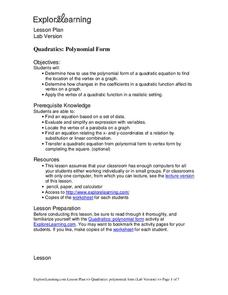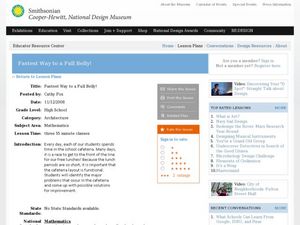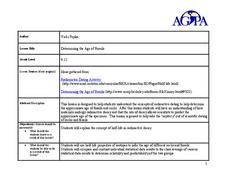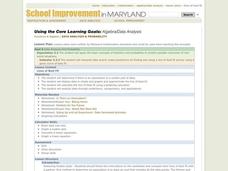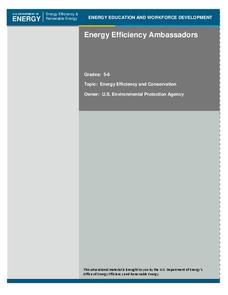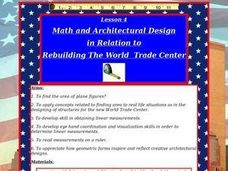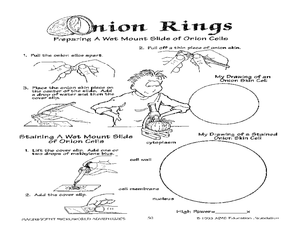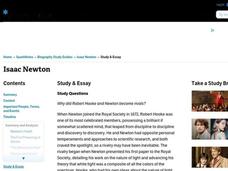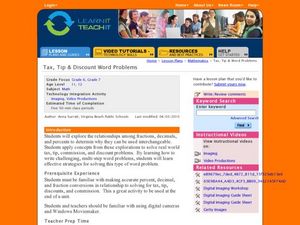Curated OER
Quadratics: Polynomial Form
Students determine how to use the polynomial form of a quadratic equation to find the location of the vertex on a graph. They determine how changes in the coefficients in a quadratic function affect its vertex on a graph. Students find...
Curated OER
Earth Science: In Depth Look at Earthquakes
Students engage in an interactive Internet lesson covering the reasons and results of earthquakes. After reading eyewitness accounts and viewing animations, they use seismograms to measure and locate the epicenters. In an ongoing study,...
Curated OER
Open Sentences
In this open sentences learning exercise, students solve and complete 10 different problems related to identifying various types of open sentences. First, they state whether each equation is true or false for the value of the variable...
Curated OER
Fastest Way to a Full Belly
Students create a scale model of a cafeteria. In this scale lesson, groups improve their actual school cafeteria layout by taking measurements of the structure and redesigning furniture and food serving lines. They create a scale drawing...
Curated OER
Determining the Age of Fossils
Students examine the concept of radioactive dating. In this radioactive dating lesson plan, students investigate how to determine the ages of fossils and rocks as they learn about half-life radioactive decay.
Curated OER
Enumeration
In this calculus lesson, students review counting using the principles of Enumeration. They use random selections to count and convert word problems and count. There are 21 problems with an answer key.
Curated OER
Lines of Best Fit
Students explore the concept of line of best fit. In this line of best fit instructional activity, students find lines of best fit in examples about riding your bike home from school and dentistry. Students find two data points and find...
Curated OER
Similarity and Congruence
Students explore the concept of similarity and congruence. In this similarity and congruence lesson plan, students identify and verify whether or not two figures are similar, congruent, or neither. Students use postulates and theorems...
Curated OER
Energy Efficiency Ambassadors
Pupils consider how to cut their energy use. In this physical science lesson, students investigate the connections between energy use and climate changes. Pupils compute the actual electrical energy consumption of 2 bulbs and consider...
Curated OER
Models and Algorithms to Solve Multiplication Problems
Students choose the correct strategy to solve multiplication and division. In this algorithm lesson, students use at least two strategies that use properties of operations and estimation. Students also recognize the relationship between...
Curated OER
Partial Products
Students use the partial products algorithm to complete multiplication problems. In this partial products lesson plan, students are introduced to the algorithm and connect the relationship to multiplication and division problems.
Curated OER
Comparison of Two Different Gender Sports Teams - Part 1 of 3 Measures of Central Tendency
Students gather and analyze data from sports teams. In this measures of central tendency lesson, students gather information from websites about sports team performance. Students analyze and draw conclusions from this data. This lesson...
Curated OER
Math and Architectural Design in Relation to Rebuilding The World Trade Center
Learners discover building plans and practice reading measurements. In this architectural design lesson, students investigate the areas of the specific World Trade Center locations that need to be rebuilt and determine the cost....
Curated OER
Onion Cells
Students observe the cells of an onion by wet mounting it and viewing it in a microscope. In this hands on lesson students make their own wet mount slide of an onion and are able to identify the cells in it such as, the nucleus,...
Curated OER
Charge-Coupled Devices (CCDs)
Students explore CCDs or Charge-Coupled Devices. In this digital devices lesson, students examine how CCDs are constructed, collect light, and create a digital signal.
Curated OER
Pythagorean Theorem
Students investigate the Pythagorean Theorem. In this seventh through twelfth grade geometery lesson plan, students explore the Pythagorean Theorem and its converse and use it to find the length of the missing side of a right triangle.
Curated OER
Iconoclasm as it pertains to the Reformation
Ninth graders examine the Protestant reformation. In this World History instructional activity, 9th graders analyze various photographs from the Reformation. Students watch a video clip of Luther's trip to Rome.
Curated OER
Standard Deviation
In this algebra activity, students identify the mean, median and mode. They use the standard deviation to solve problems. There are 10 questions with an answer key.
Curated OER
Isaac Newton
In this online interactive history quiz worksheet, learners respond to 10 short answer and essay questions about the life and accomplishments of Isaac Newton.
Curated OER
Tax, Tip and Discount Word Problems
Students solve problems involving tax, tips and discounts. In this algebra lesson, students convert between percents and decimals. They calculate commission using conversion from percents and fractions.
Curated OER
Reflections
Students investigate image and pre-image. In this geometry lesson, students identify the reflection and rotation of different shape on a coordinate plane. They identify similarities and differences of image and pre-image of a reflection.
Curated OER
Factoring Trinomials
Students factor trinomials. In this algebra lesson, students use special patterns and formulas to factor. They utilize algebra tiles as a hands-on method for gaining practice with trinomials.
Curated OER
What Are The Chances
Students calculate the probability of an event occurring. In this probability lesson, students differentiate between independent, dependent or compound events. They find the range of the data.
Curated OER
Secant Line Approximation of the Tangent Line
Students perform operation with secant and tangent lines. For this calculus lesson, students find the derivative and relate it to the slope of a line. They differentiate between secant and tangent as they intersect a circle, using Cabri.


